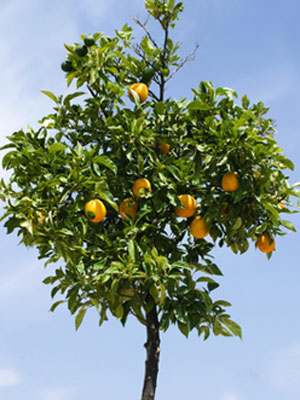Crop Rotation Group
Miscellaneous
|

|
Soil
Free-draining soil-based potting mix. Choose oranges grafted onto a dwarfing rootstock for growing in containers.
|
Position
A sheltered spot in full sun spring to fall. In winter, plants may be moved into a greenhouse, sunroom, or heated garage.
|
Frost tolerant
No. Grow at temperatures above 7°C (45°F).
|
Feeding
In spring and summer, feed regularly with a liquid fertiliser. Yellowing leaves indicate a need for more nitrogen.
|
Companions
Oranges and other citrus are heavy feeders that resent close company, so companion plants have to be planted a little way away.
|
Spacing
Single Plants: 1' 11" (60cm) each way (minimum)
Rows: 1' 11" (60cm) with 1' 11" (60cm) row gap (minimum)
|
Sow and Plant
Grow in containers of rich compost to keep plants compact and to make it easy to bring plants indoors for the winter. Good drainage is essential. Start small plants in containers at least 12" (30cm) wide and pot them up a size yearly until they reach mature size.
Our Garden Planning Tool can produce a personalized calendar of when to sow, plant and harvest for your area.
|
Notes
Prune in spring or summer to shape plants, and watch for thorns. Very sweet oranges need a long season of warm weather, but kumquats, calamondin oranges and satsumas fruit well in marginal areas or when grown in containers.
|
Harvesting
Pick when richly colored and fully ripe. Picking can continue for several weeks as fruits do not ripen all at once.
|
Troubleshooting
Grow outdoors in the warmer months to expose plants to heat and pollinators. Soft soap sprays can help against scale insects.
|